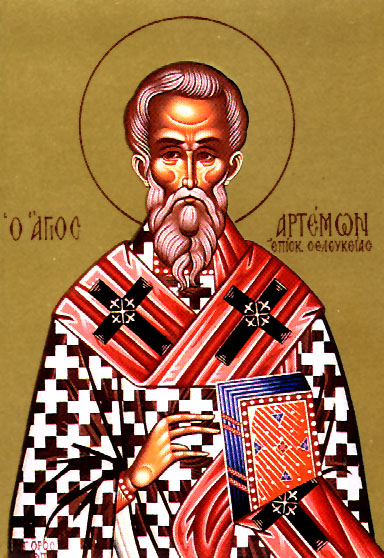

The Hieromartyr Artemon was born of Christian parents in Laodicea, Syria in the first half of the third century. From his youth, he dedicated himself to the service of the Church. The saint served the Church as a Reader for sixteen years. For his zeal in Church services, Artemon was ordained a deacon by Bishop Sisinius. St. Artemon also fulfilled this service with fervor and diligence for twenty-eight years, then he was ordained to the priesthood. In this position, St. Artemon served the Church of God for thirty-three years, preaching Christianity among pagans. When the emperor Diocletian (284-305) began his fierce persecution against Christians, St. Artemon was already old. The emperor issued an edict ordering Christians to offer sacrifice to idols. The hieromartyr Artemon, instructed by the voice of God, preached the Gospel in Asia Minor. Then an angel appeared to him and transported him to the place which has been revealed to him, where he converted many to Christ. Pagans seized the saint and beheaded him.
Troparion
O holy priest-martyr Artemon, you lent yourself to the apostles’ way of life and succeeded them in their throne. Inspired by God, you found your way to contemplation through the practice of virtue. Therefore, you became a perfect teacher of truth, fighting for the faith unto the shedding of your blood. Intercede with Christ our God that He may save our souls.
Kontakion
You set out firmly with priestly devotion and completed the course in martyrdom. You passed into heaven, O wise Artemon and received laurels which will never fade. Now we come to celebrate your holy memory, crying out: As you stand before Christ, remember us, O martyr.
Epistle
Acts 5: 21-33
In those days, the apostles went into the temple at dawn and resumed their teaching. When the priest and his supporters arrived they convoked the Sanhedrin, the full council of the elders of Israel. They sent word to the jail that the prisoners were to be brought in. But when the temple guard got to the jail they could not find them, and hurried back with the report, “We found the jail securely locked and the guards at their posts outside the gates, but when we opened it we found no one inside.”
On hearing this report, the captain of the temple guard and the high priests did not know what to make of the affair. Someone then came up to them, pointing out, “Look, there! Those men you put in jail are standing over there in the temple, teaching the people.” At that, the captain went off with the guard and brought them in, but without any show of force, for fear of being stoned by the crowd. When they let them in and made them stand before the Sanhedrin, the high priest began the interrogation in this way: “We gave you strict orders not to teach about that name, yet you have filled Jerusalem with your teaching and are determined to make us responsible for that man’s blood.” To this, Peter and the apostles replied: “Better for us to obey God than men! The God of our fathers has raised up Jesus whom you put to death, hanging him on a tree. He whom God has exalted at his right hand as ruler and Savior is to bring repentance to Israel and forgiveness of sins. We testify to this. So too does the Holy Spirit, whom God has given to those that obey him.” When the Sanhedrin heard this, they were stung to fury and wanted to kill them.
Gospel
John 6: 14-27
At that time when the people saw the sign Jesus had performed they began to say, “this is undoubtedly the prophet who is to come into the world.” At that, Jesus realized that they would come and carry him off to make him king, so he fled back to the mountain alone.
As evening drew on, his disciples came down to the lake. They embarked, intending to cross the lake toward Capernaum. By this time it was dark, and Jesus had still not joined them; moreover, with a strong wind blowing the sea was becoming rough. Finally, when they had a road three or 4 miles, they say to Jesus approaching the boat, walking on the water. They were frightened, but he told them, “It is I; do not be afraid.” They wanted to take him into the boat, but suddenly it came aground on the shore they had been approaching.
The crowd remained on the other side of the lake. The next day they realized that there had been only one boat there and that Jesus had not left in it with his disciples; rather, they had set out by themselves. Then some boats came out from Tiberias near the place where they had eaten the bread after the Lord had given thanks. Once the crowd saw that neither Jesus nor his disciples were there they too embarked in the boats and went to Capernaum looking for Jesus.
When they found him on the other side of the lake, they said to him, “Rabbi, when did you come here?” Jesus answered them: “I assure you, you are not looking for me because you have seen signs but because you have eaten your fill of the loaves. You should not be working for perishable food but for food that remains unto life eternal, food which the Son of Man will give you; it is on him that God the Father has set his seal.”
Icon courtesy of Jack Figel, Eastern Christian Publications – ecpubs.com
Saturday, April 13 –